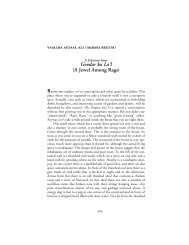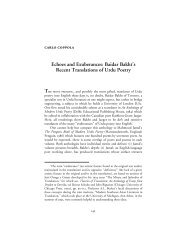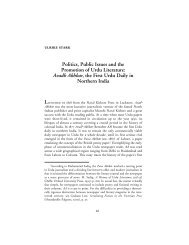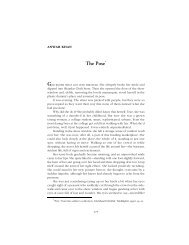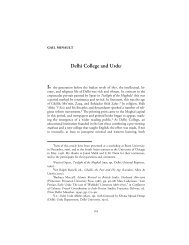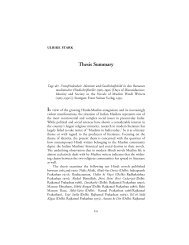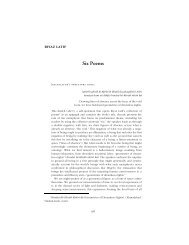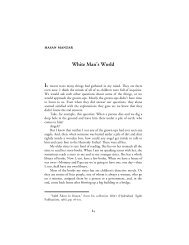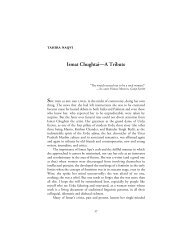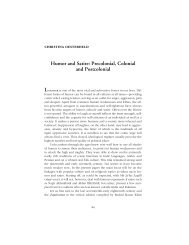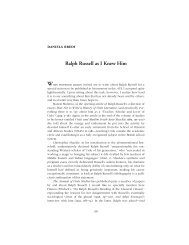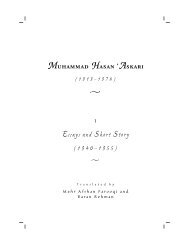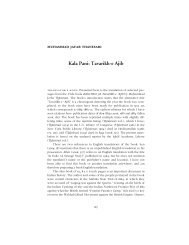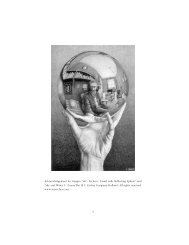Form or Mere Illusion?* - the Annual of Urdu Studies
Form or Mere Illusion?* - the Annual of Urdu Studies
Form or Mere Illusion?* - the Annual of Urdu Studies
- No tags were found...
Create successful ePaper yourself
Turn your PDF publications into a flip-book with our unique Google optimized e-Paper software.
12 • The <strong>Annual</strong> <strong>of</strong> <strong>Urdu</strong> <strong>Studies</strong>, No. 25should not be revealed to o<strong>the</strong>rsówhich is <strong>the</strong> chief characteristic <strong>of</strong> <strong>the</strong>Baudelairean ìDandy.îWariness <strong>of</strong> emotions led <strong>the</strong> new artist to adopt one <strong>of</strong> two methods:ei<strong>the</strong>r f<strong>or</strong>age f<strong>or</strong> totally new and vague emotions no one had experiencedbef<strong>or</strong>e and present <strong>the</strong>m as riddles so <strong>the</strong> degenerates would not evensuspect <strong>the</strong>y had anything to do with <strong>the</strong>móa method opted f<strong>or</strong> by Verlaineand Mallarmé; <strong>or</strong>, alternatively, try to rid oneself <strong>of</strong> subject andmeaning altoge<strong>the</strong>r. So <strong>the</strong> notion was floated that, like music, poetry tooshould be free <strong>of</strong> associations. Listening to a composition, a person hardlythinks about <strong>the</strong> fact that a particular sound is from a partridge <strong>or</strong> a quail,one hears it as pure sound and enjoys <strong>the</strong> manner in which it is arrangedand harmonized with o<strong>the</strong>r sounds. Poetry should aspire to that so whenit is heard it does not call f<strong>or</strong> meaning, and sound alone provides completegratification. Flaubert tried to free fiction, <strong>or</strong> prose, <strong>of</strong> semantic baggage.He felt <strong>the</strong> present time was hardly congenial f<strong>or</strong> <strong>the</strong> production <strong>of</strong>great literature. It was so s<strong>or</strong>did, filthy, and grotesque that a person couldnot even conceive <strong>of</strong> thinking about it and beauty toge<strong>the</strong>r. And yet <strong>the</strong>present was <strong>the</strong> only time <strong>the</strong> new artist could draw on f<strong>or</strong> his subject.The only recourse left now was to push <strong>the</strong> filth and ugliness <strong>of</strong> his subjectas far away as possible, <strong>or</strong> at least neutralize it through his art andstyle. This does away with <strong>the</strong> imp<strong>or</strong>tance <strong>of</strong> subject itself and makes styleparamount. Can one not create a w<strong>or</strong>k without subject merely by writing?Flaubertís fear <strong>of</strong> his own emotions is w<strong>or</strong>th examining. On <strong>the</strong> one hand,all his life he kept saying that his novels amounted to nothing. Theysought to represent <strong>the</strong> middle classóa trite and vulgar subject. If hecould find a subject he liked, he would be able to do a lot. On <strong>the</strong> o<strong>the</strong>rhand, he longed to write a novel that had no subject, one that survived on<strong>the</strong> strength <strong>of</strong> pure style. So we find a strange phenomenon during thisperiod: artists bending over backwards to create without any substance.This is an absurd struggle, especially in literature. While in music andpainting it is perhaps possible to a degree to confine a w<strong>or</strong>k to <strong>the</strong> domain<strong>of</strong> aes<strong>the</strong>tics (after all sounds, lines, and col<strong>or</strong>s do possess somemeasure <strong>of</strong> autonomous objectivity; one can arrange lines in a way thatmay not result in great art, but <strong>the</strong>ir arrangement does appear pleasing,which may be enough), w<strong>or</strong>ds do not have such independence <strong>or</strong> suchautonomy as lines and sounds. W<strong>or</strong>ds are not pure sounds, and nei<strong>the</strong>rare <strong>the</strong>y natural. They are an invention <strong>of</strong> man and <strong>the</strong>y are invented f<strong>or</strong> aspecific purpose. They are signs. They guide <strong>the</strong> mind to a particularthought and a specific meaning. Making <strong>the</strong>m ìpureî means divesting<strong>the</strong>m <strong>of</strong> <strong>the</strong>ir semantic content, which would obliterate all distinctionbetween w<strong>or</strong>ds and sounds. That is to say, literature would meld into musicand disappear. Thus literature, if it must keep its status intact, cannotrid itself <strong>of</strong> subject and meaning. Literature without meaning is a rarity



